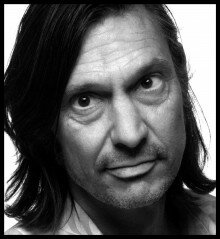Nederlands ►

Arjen Duinker was born in Delft in 1956 and studied psychology and philosophy. He has published one novel, Het moeras (The Morass, 1992), and eleven volumes of poetry. He made his debut as a poet in 1988 with the volume Rode oever (Red Shore). This was followed by such volumes as Losse gedichten (Loose Poems, 1990), De gevelreiniger en anderen (The Sandblaster and Others, 1994), Het uur van de droom (The Dreaming Hour, 1996) and Ook al is het niet zo (Even If It Isn’t So, 1998). In 2001 Duinker received the Jan Campert Prize for his volume De geschiedenis van een opsomming (The History of an Enumeration, 2000). Misschien vier vergelijkingen (Four Equations Perhaps, 2002) was nominated for the VSB Poetry Prize 2003, while De zon en de wereld (The Sun and the World, 2004) won that same prize in 2005 and has been published in English translation in Australia. Further book-length collections have appeared in France, Portugal, Italy, Iran, Russia and the UK, and are in preparation in China, Finland, Croatia and Mexico. One of Duinker’s poems was translated into 220 different languages for a project called ‘World Poem’. Together with the French poet Karine Martel he has written En dat ? Oneindig (And That ? Infinite), which was published in Dutch in 2006. His most recent collection is Buurtkinderen (Neighbourhood Kids, 2009)
On the appearance of Rode oever, it was immediately obvious that a poet had emerged who did not, or did not want to fit into the mould of a Dutch poet. The volume included poems which seemed to be little more than one-dimensional descriptions of reality. Something Duinker did with such poise that the inevitable postmodernist question seemed completely superfluous. Which reality? Just reality. From the very beginning, Duinker's poetry has always been about the reality of flowers, stones, mountains, rain, wind, ivy, rivers, the reality of things as separate self-contained entities. That is: all these things as they exist without the interposition of human, all-too-human thought, without the interposition of the abstractions that rear their heads as soon as a human opens his mouth. In his second volume, Losse gedichten, we read: 'If you give me abstractions,/ I'll give you a fan of wood and: Nothing is more foreign to me than belief,/ Nothing is more foreign to me than emotional connection/ through thought. What he wants is that: of things/ the very things become visible.'
In his collections to date he has consistently tried to shed his own personality, essence and baggage in order to smuggle into his poems the things he experiences without thinking: the effortlessness, the self-evidence of things like flowers and stones. In every poem it's as if the poet is, to quote from Het uur van de droom, 'body-searched by uninterpreted nonhuman reality'. Things go through his pockets, his clothes, his head, his whole personality for that human, all-too-human quality that ensures that people always perceive themselves facing reality. In Het uur van de droom the square in the long poem 'De uren' (The Hours) 'Lets me linger in the shadow/ of every possibility./ Comes over to me/ And searches me/ Recoils/ And starts to laugh.'
The laughter of reality itself is often heard in his poetry. This laughter ensures that the stone that cannot blossom blossoms, that the permanent abstraction of language becomes wooden fans in Duinker's hands, and that readers immediately hear reality itself speaking in a line like: 'I'm silent about reality'. The poet calls out: 'Come, things that stay and laugh, notice me!' This request, this longing to be a part of an undivided reality, a reality experienced not with the mind but with all the senses, leads to poetry that comes in search of the reader's own all-too-human qualities. The poems come right up to the reader, go through his pockets, check the seams and hems of his personality, his essence, his baggage, amiably but determinedly shaking him down.
Marc Reugebrink
Publications:
Rode oever, Meulenhoff, Amsterdam 1988
Losse gedichten, Meulenhoff, Amsterdam 1990
Het moeras (novel), Meulenhoff, Amsterdam 1992
De gevelreiniger en anderen, Meulenhoff, Amsterdam 1994
Het uur van de droom, Meulenhoff, Amsterdam 1996
Zaap zaap kwaririp, together with Désirée Achterkamp, Rotterdam 1997
Ook al is het niet zo, Meulenhoff, Amsterdam 1998
De wereld van de glasblazer I, together with Bernard Heesen and Désirée Achterkamp, De Oude Horn, Acquoy 1999
De geschiedenis van een opsomming, Meulenhoff, Amsterdam 2000
Misschien vier vergelijkingen, Meulenhoff, Amsterdam 2002
De wereld van de glasblazer II, together with Bernard Heesen and Désirée Achterkamp, De Oude Horn, Acquoy 2003
De Zon en de Wereld, Meulenhoff, Amsterdam 2003
En dat ? Oneindig, together with Karine Martel, Querido, Amsterdam 2006
Buurtkinderen, Querido, Amsterdam 2009
Translated collections (selection):
La pietra fiorisce (Mobydick, Faenza 2002, Italian translations by Giorgio Fagin)
The sublime song of a maybe (Arc Publications, Todmorden 2002, English translations by Willem Groenewegen)
L'histoire d'une énumération (Éditions Caractères, Paris 2003, French translations by Daniel Cunin)
A canção sublime de um talvez (Teorema, Lisboa 2003, Portuguese translations by Arie Pos)
Istorija perecislenij (ZAO izdatel'stvo zurnada "Neva", St. Petersburg 2006, Russian translations by Julia Telezjko)
Awaze shegefte shayad (Parang, Teheran 2006, Farsi translations by Amir Afrassiabi)
Links
In English
A review in Stride Magazine
In German
Arjen Duinker on Lyrikline
In Finnish
Ten poems in Tuli&Savu, a Finnish poetry quarterly
In Dutch
Vogels antwoorden niet (Dutch video)

